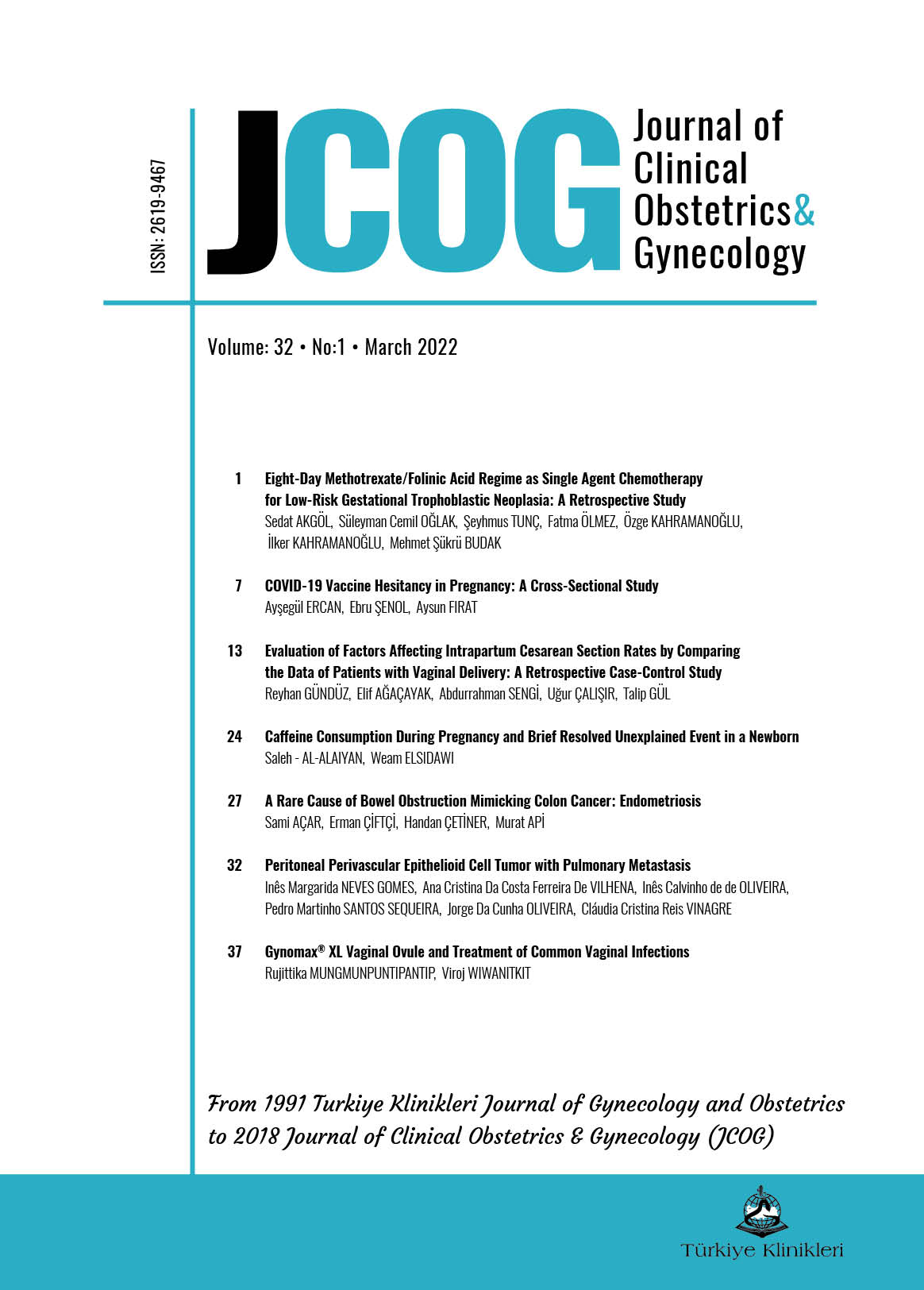Open Access
Peer Reviewed
CASE REPORTS
1675 Viewed1443 Downloaded
Caffeine Consumption During Pregnancy and Brief Resolved Unexplained Event in a Newborn
Received: 10 Sep 2021 | Received in revised form: 22 Feb 2022
Accepted: 24 Feb 2022 | Available online: 25 Feb 2022
JCOG. 2022;32(1):24-6
DOI: 10.5336/jcog.2021-86162
Article Language: EN
Article Language: EN
Copyright Ⓒ 2025 by Türkiye Klinikleri. This is an open access article under the CC BY-NC-ND license (http://creativecommons.org/licenses/by-nc-nd/4.0/)
ABSTRACT
Caffeine is a very commonly used substance. has been associated with negative pregnancy outcomes. We present a neonate with brief resolved unexplained event presumable due to heavy coffee consumption during pregnancy. The neonate presented with symptoms in the form of apnea and cyanosis that required vigorous stimulation to return him to spontaneous breathing. Sepsis, congenital heart disease, seizure and inborn error of metabolism were all excluded. he mother reported that during pregnancy she was consuming 1-2 large cups of brewed coffee (480 mL) every day that volume of coffee contained 265-300 mg. The neonate overtime improved when withdrawal effect of caffeine resolved. We advise pregnant women and women planning to get pregnant to limit caffeine consumption.
Caffeine is a very commonly used substance. has been associated with negative pregnancy outcomes. We present a neonate with brief resolved unexplained event presumable due to heavy coffee consumption during pregnancy. The neonate presented with symptoms in the form of apnea and cyanosis that required vigorous stimulation to return him to spontaneous breathing. Sepsis, congenital heart disease, seizure and inborn error of metabolism were all excluded. he mother reported that during pregnancy she was consuming 1-2 large cups of brewed coffee (480 mL) every day that volume of coffee contained 265-300 mg. The neonate overtime improved when withdrawal effect of caffeine resolved. We advise pregnant women and women planning to get pregnant to limit caffeine consumption.
REFERENCES:
- Kuczkowski KM. Caffeine in pregnancy. Arch Gynecol Obstet. 2009;280(5):695-8. [Crossref] [PubMed]
- al-Alaiyan S, al-Rawithi S, Raines D, Yusuf A, Legayada E, Shoukri MM, et al. Caffeine metabolism in premature infants. J Clin Pharmacol. 2001;41(6):620-7. [Crossref] [PubMed]
- Morris MB, Weinstein L. Caffeine and the fetus: is trouble brewing? Am J Obstet Gynecol. 1981;140(6):607-10. [Crossref] [PubMed]
- CARE Study Group. Maternal caffeine intake during pregnancy and risk of fetal growth restriction: a large prospective observational study. BMJ. 2008;337:a2332. Erratum in: BMJ. 2010;340. [Crossref] [PubMed] [PMC]
- Ford RP, Schluter PJ, Mitchell EA, Taylor BJ, Scragg R, Stewart AW. Heavy caffeine intake in pregnancy and sudden infant death syndrome. New Zealand Cot Death Study Group. Arch Dis Child. 1998;78(1):9-13. [Crossref] [PubMed] [PMC]
- Fenster L, Eskenazi B, Windham GC, Swan SH. Caffeine consumption during pregnancy and fetal growth. Am J Public Health. 1991;81(4):458-61. [Crossref] [PubMed] [PMC]
- Rivkees SA, Wendler CC. Long-term consequences of disrupting adenosine signaling during embryonic development. Mol Aspects Med. 2017;55:110-7. [Crossref] [PubMed] [PMC]
- James JE. Maternal caffeine consumption and pregnancy outcomes: a narrative review with implications for advice to mothers and mothers-to-be. BMJ Evid Based Med. 2021;26(3):114-5. [Crossref] [PubMed] [PMC]
MENU
POPULAR ARTICLES
MOST DOWNLOADED ARTICLES





This journal is licensed under a Creative Commons Attribution-NonCommercial-NoDerivatives 4.0 International License.










